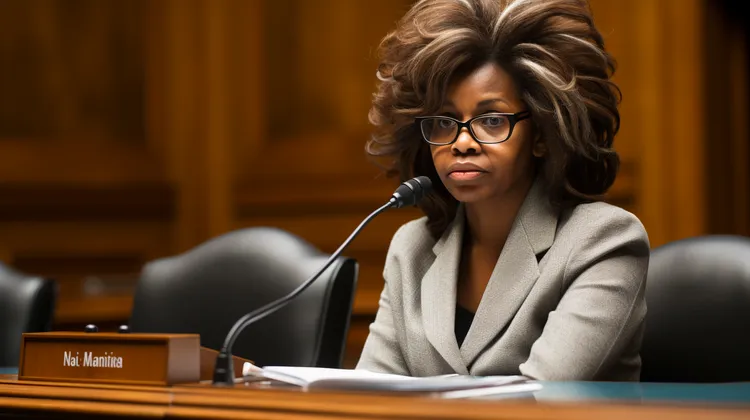In the realm of cryptocurrency, stablecoins have gained considerable popularity in recent years due to their promise of providing stability amidst the volatility of traditional cryptocurrencies like Bitcoin and Ethereum. One such stablecoin in the limelight is PayPal’s USD (PYUSD) stablecoin, which has garnered attention from investors and regulators alike. Concerns have been raised regarding the lack of a regulatory framework surrounding the PayPal USD stablecoin.
Maxine Waters, the ranking member of the committee, expressed her deep concerns about the stablecoin in an Aug. 9 statement. Waters stressed the absence of a regulatory framework, which raises crucial questions about investor safeguards and oversight. With the potential for large-scale investments flowing into stablecoins, it becomes imperative to establish a comprehensive regulatory framework that can ensure the protection of investors and the stability of the market.
Stablecoins are designed to maintain a stable value by pegging them to a reserve asset, usually a fiat currency like the US dollar. This stability is achieved through the reserve asset being held in a secure account, which should ideally be regulated by authorities to prevent misuse or fraudulent activities. The absence of regulatory oversight for the PayPal USD stablecoin poses risks that need to be addressed.
One concern is the potential misuse of funds or mismanagement of the reserve asset. Without adequate regulatory measures, there is a lack of transparency and accountability when it comes to how the reserve asset is managed. Investors need reassurance that their funds are held securely and that their value is protected.
The possibility of market manipulation cannot be overlooked. Stablecoins play a crucial role in the cryptocurrency ecosystem, with a significant impact on the overall market. Without regulatory oversight, there is a risk that bad actors could exploit the system, manipulate the value of the stablecoin, or engage in other fraudulent activities.
The absence of regulation could hinder the adoption and integration of stablecoins into the traditional financial system. Financial institutions, which are subject to rigorous regulatory scrutiny, may be hesitant to engage with stablecoins like the PayPal USD without a clear regulatory framework. This reluctance may limit the potential benefits these stablecoins can bring to the broader financial landscape.
To address these concerns, it is crucial to establish a comprehensive regulatory framework for stablecoins like PayPal USD. Such a framework should include robust oversight mechanisms, stringent licensing requirements, and transparent reporting standards. Regulatory authorities should be empowered to monitor the reserve assets and ensure they are held securely and independently audited.
Investor protection measures need to be put into place. This could include mandatory disclosures, clear guidelines on risk management, and avenues for redress in case of fraudulent activities or mismanagement. By instilling trust and confidence in the stablecoin market, regulatory oversight can help attract more institutional investors, leading to a more stable and mature ecosystem.
Collaboration between regulators and industry participants is crucial in designing an effective regulatory framework. Stakeholders should come together to identify potential risks, propose solutions, and create guidelines that strike the right balance between innovation and investor protection. By engaging with industry experts and learning from best practices, regulators can develop a framework that adapts to the evolving needs of the stablecoin market.
It is worth noting that regulatory oversight should not stifle innovation or impede the growth of the stablecoin market. Instead, it should provide a solid foundation that ensures market integrity, financial stability, and investor protection. A well-designed regulatory framework can foster trust, attract more participants, and help stablecoins fulfill their potential as a reliable and accessible form of digital currency.
Concerns raised by Maxine Waters regarding the PayPal USD stablecoin’s lack of a regulatory framework highlight important issues that need to be addressed. Establishing a comprehensive regulatory framework for stablecoins is essential to safeguard investor interests, prevent fraudulent activities, and foster the integration of stablecoins into the traditional financial system. Collaborative efforts between regulators, industry participants, and stakeholders will be key to designing an effective framework that balances innovation and investor protection. With the right regulatory measures in place, stablecoins like the PayPal USD can contribute to a more stable and secure digital currency ecosystem.




It’s disappointing to see financial institutions hesitant to engage with stablecoins due to the lack of clear regulatory guidelines.
These concerns highlight the urgent need for a regulatory framework that can provide transparency, accountability, and investor protection in the stablecoin market.
It’s disheartening to see that stablecoins still lack a comprehensive regulatory framework to ensure their stability.
It’s frustrating that stablecoins are gaining popularity without clear regulatory oversight to protect investors.
Investor protection measures are essential in the stablecoin market. Mandatory disclosures, risk management guidelines, and avenues for redress can instill confidence among investors. Let’s prioritize their interests! 💰
This is just another example of how unregulated cryptocurrencies can pose risks to investors.
Stablecoins play a crucial role in the cryptocurrency ecosystem. But without a regulatory framework, their integration into the traditional financial system may be hindered. Let’s bridge this gap and unlock their potential! 💼